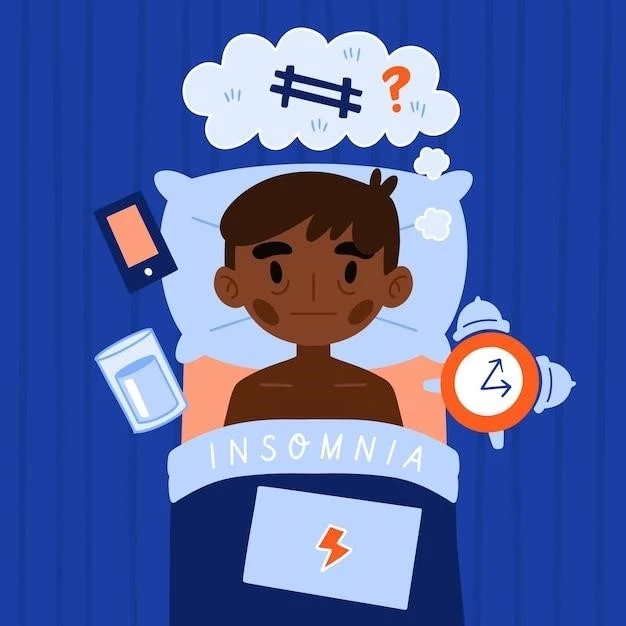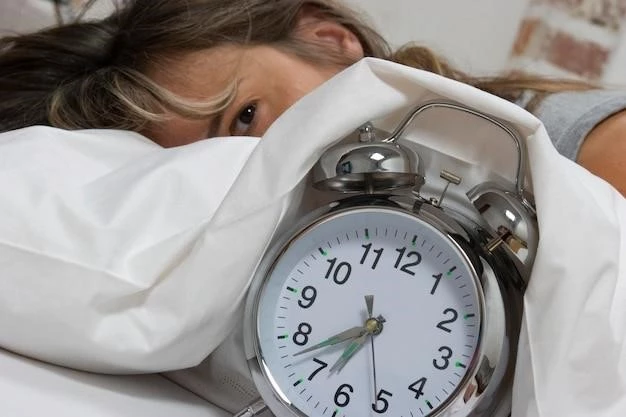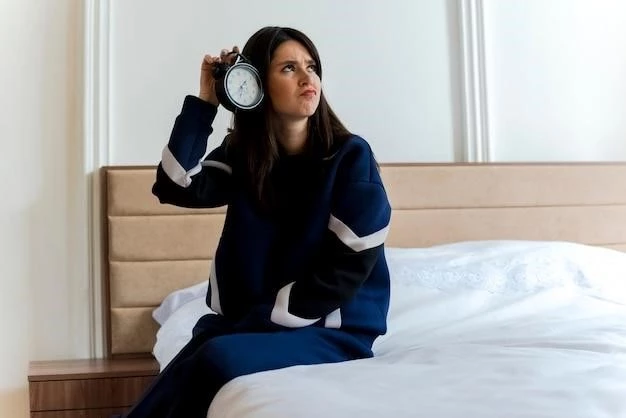Article Plan⁚ Disease ─ Non-24-hour Sleep-Wake Disorder
Non-24-hour sleep-wake disorder (non-24 or N24SWD) is a circadian rhythm disorder where individuals experience delays in their sleep-wake cycle daily. This condition commonly affects individuals living outside the typical 24-hour day‚ impacting their daily routines and overall well-being.
Introduction to Non-24-hour Sleep-Wake Disorder
Non-24-hour sleep-wake disorder (non-24 or N24SWD) is a chronic circadian rhythm disorder characterized by a delayed sleep-wake cycle. Individuals with this disorder experience disruptions in their sleep patterns‚ with gradual shifts in their sleep-onset and wake times. This condition is particularly prevalent in populations living in environments that do not adhere to the standard 24-hour day-night cycle.
Individuals affected by non-24-hour sleep-wake disorder exhibit a circadian rhythm that extends beyond the typical 24-hour cycle‚ leading to difficulties in synchronizing with the natural light-dark cycle. This results in a continual drift of their sleep-wake patterns‚ causing challenges in falling asleep at conventional times and waking up in alignment with societal norms.
Moreover‚ non-24-hour sleep-wake disorder is associated with various symptoms‚ including irregular sleep episodes‚ daytime sleepiness‚ and nighttime wakefulness. It commonly impacts individuals who are blind‚ as their visual impairment hinders light perception‚ a crucial factor in regulating the circadian rhythm. As a result‚ these individuals may face persistent challenges in maintaining a consistent sleep-wake schedule.
Symptoms and Diagnosis

Non-24-hour sleep-wake disorder presents with symptoms such as irregular sleep patterns‚ daytime sleepiness‚ and nighttime wakefulness. The diagnosis involves evaluating the individual’s sleep history‚ patterns‚ and ruling out other sleep disorders through polysomnography and actigraphy tests. Diagnosis also includes assessing the consistency and timing of symptoms to differentiate N24SWD from other circadian rhythm disorders.
Individuals with non-24-hour sleep-wake disorder commonly experience challenges in aligning their sleep schedules with societal norms‚ leading to disruptions in daily life activities and work performance. The irregular sleep patterns and difficulties in maintaining a consistent sleep-wake cycle can significantly impact an individual’s overall well-being and quality of life.
Diagnosis of non-24-hour sleep-wake disorder is essential in understanding and addressing the underlying circadian rhythm disturbances. Health professionals use a combination of patient history‚ sleep logs‚ and objective assessments to diagnose N24SWD accurately. It is crucial to identify and differentiate this disorder from other circadian rhythm-related conditions to provide appropriate treatment and management strategies.
Causes of Non-24-hour Sleep-Wake Disorder
Non-24-hour sleep-wake disorder is primarily caused by an individual’s circadian clock being out of sync with the 24-hour day-night cycle. For most people‚ their internal clock naturally resets to match the external light-dark cues‚ but individuals with N24SWD have an endogenous circadian rhythm that does not align with the standard day length‚ leading to the recurrent delays in their sleep-wake patterns.
Research suggests that the prevalence of non-24-hour sleep-wake disorder is higher in individuals who are blind‚ as the absence of light perception affects their ability to synchronize their circadian rhythm with the external environment. This disruption in the light-dark cycle can result in the gradual drift of sleep and wake times‚ causing significant challenges in maintaining a regular sleep schedule.
Furthermore‚ the neurological mechanisms underlying N24SWD involve dysregulation in the production and release of melatonin‚ a hormone that plays a crucial role in regulating the sleep-wake cycle. The imbalance in melatonin secretion can disrupt the body’s internal clock‚ contributing to the onset and perpetuation of non-24-hour sleep-wake disorder.
Risk Factors Associated with the Disorder
Non-24-hour sleep-wake disorder (N24SWD) primarily affects individuals with circadian rhythms that do not align with the typical 24-hour day-night cycle. While the condition is more common in individuals who are blind due to the absence of light perception‚ it can also occur in sighted individuals with inherent circadian rhythm irregularities. Factors such as disruptions in melatonin production and light exposure play a crucial role in the development of N24SWD.
Those with N24SWD face challenges maintaining a consistent sleep-wake schedule‚ leading to disruptions in daily activities and work performance. The cyclic progression of sleep and wake times shifting out of sync with the external light-dark cycle results in persistent sleep disturbances and daytime sleepiness. Understanding the risk factors associated with N24SWD is crucial for accurate diagnosis and implementation of appropriate management strategies.
Prevalence and Population Affected
Non-24-hour sleep-wake disorder (N24SWD) is a rare circadian rhythm disorder that impacts individuals whose internal body clocks differ from the standard 24-hour day-night cycle. While less common‚ the condition is primarily observed in blind individuals due to the absence of light cues required for circadian alignment. N24SWD affects fewer than 100‚000 people in the United States‚ with prevalence varying globally.
Individuals with N24SWD experience challenges in coordinating their sleep and wake times with the external light-dark cycle‚ leading to disruptions in their daily routines and work schedules. The condition causes a gradual shift in sleep patterns‚ making it difficult for affected individuals to fall asleep at conventional times and stay awake during the day.
This circadian rhythm disorder presents unique difficulties for those affected‚ as their sleep-wake cycle does not synchronize with the natural 24-hour daylight cycle. While N24SWD predominantly affects visually impaired individuals‚ it can also occur in sighted individuals with inherent circadian rhythm irregularities‚ albeit less frequently.
Understanding the prevalence and impact of non-24-hour sleep-wake disorder is essential for healthcare professionals to recognize and diagnose this condition accurately. By raising awareness of N24SWD and its effects on individuals’ daily lives‚ appropriate support and management strategies can be implemented to improve quality of life for those affected by this circadian rhythm disorder.
Impact on Individuals’ Daily Life
Non-24-hour sleep-wake disorder can significantly disrupt an individual’s daily life‚ leading to challenges in maintaining a regular sleep-wake schedule. The ever-shifting sleep patterns caused by this circadian rhythm disorder can result in difficulties falling asleep at night and staying awake during the day. This inconsistency can lead to daytime fatigue‚ decreased productivity‚ and difficulties in meeting work or social obligations.
Individuals with non-24-hour sleep-wake disorder may experience feelings of isolations due to their unconventional sleep patterns‚ making it challenging to synchronize activities with others. The cyclic progression of their sleep-wake cycle outside the typical 24-hour day can impact relationships‚ work performance‚ and overall quality of life. Managing the symptoms of N24SWD can be a daily struggle for affected individuals.
Furthermore‚ the irregular sleep patterns associated with N24SWD can result in mood disturbances‚ cognitive impairments‚ and an overall sense of disorientation. The constant shift in sleep times can lead to chronic sleep deprivation‚ exacerbating the challenges faced by individuals with this circadian rhythm disorder. Seeking support from healthcare providers and accessing appropriate treatment can help individuals cope with the impact of non-24-hour sleep-wake disorder on their daily routines.
Treatment Options for Non-24-hour Sleep-Wake Disorder
Individuals diagnosed with non-24-hour sleep-wake disorder (N24SWD) have several treatment options available to manage their circadian rhythm disturbance. One common approach involves the use of melatonin supplementation to help regulate the sleep-wake cycle. Melatonin‚ a hormone that influences the body’s internal clock‚ can be taken at specific times to realign the sleep patterns with the desired schedule.
Light therapy is another effective treatment for N24SWD‚ as exposure to bright light at strategic times can help reset the circadian rhythm and promote synchronization with the 24-hour day-night cycle. By incorporating light therapy into daily routines‚ individuals with non-24-hour sleep-wake disorder can gradually shift their sleep patterns to align with societal norms and improve overall sleep quality.
Cognitive behavioral therapy for insomnia (CBT-I) is also beneficial for individuals with N24SWD‚ as it addresses the psychological factors contributing to sleep disturbances and helps establish healthy sleep habits. By working with a healthcare provider or sleep specialist‚ individuals can learn effective strategies to improve sleep efficiency and manage the challenges associated with non-24-hour sleep-wake disorder.
Additionally‚ maintaining a consistent sleep schedule‚ practicing good sleep hygiene‚ and creating a sleep-conducive environment can complement treatment strategies for N24SWD. By adopting a holistic approach that combines behavioral interventions‚ light therapy‚ and melatonin supplementation‚ individuals with non-24-hour sleep-wake disorder can better manage their condition and improve their overall sleep patterns.
Importance of Melatonin in Managing the Disorder
Melatonin plays a crucial role in managing non-24-hour sleep-wake disorder (N24SWD) by helping regulate the sleep-wake cycle. Individuals with N24SWD often have disruptions in melatonin production‚ which can lead to difficulties in aligning their internal body clock with the external light-dark cycle. Supplementing with melatonin can help realign the circadian rhythm‚ making it easier for individuals to establish a consistent sleep schedule.
By taking melatonin supplements at specific times‚ individuals with N24SWD can synchronize their sleep patterns with the desired schedule‚ promoting better sleep quality and daytime wakefulness. Melatonin supplementation is often used in conjunction with other treatment modalities‚ such as light therapy and cognitive behavioral therapy‚ to effectively manage the symptoms of non-24-hour sleep-wake disorder.
The importance of melatonin in managing N24SWD lies in its ability to influence the body’s internal clock and promote synchronization with the external environment. By addressing the underlying circadian rhythm disturbances with melatonin supplementation‚ individuals with non-24-hour sleep-wake disorder can improve their sleep-wake cycle and enhance their overall well-being.
Research and Studies on Non-24-hour Sleep-Wake Disorder
Research on non-24-hour sleep-wake disorder (N24SWD) focuses on understanding the underlying mechanisms of this circadian rhythm disorder and developing effective treatment strategies. Studies have investigated the role of melatonin‚ light therapy‚ and behavioral interventions in managing N24SWD and improving sleep-wake patterns.
Recent research has highlighted the importance of melatonin supplementation in regulating the sleep-wake cycle of individuals with N24SWD. By targeting the disruptions in melatonin production associated with this disorder‚ researchers aim to enhance circadian alignment and promote more stable sleep patterns.
Additionally‚ studies have explored the effectiveness of light therapy in resetting the circadian rhythm of individuals with non-24-hour sleep-wake disorder. By exposing individuals to bright light at specific times‚ researchers have observed improvements in synchronizing sleep-wake cycles and reducing the symptoms of N24SWD.
Behavioral interventions‚ such as cognitive behavioral therapy‚ have also been investigated as complementary approaches to managing N24SWD. These interventions aim to address the psychological aspects of sleep disturbances and promote healthy sleep habits in individuals with circadian rhythm disorders.
Ongoing research continues to advance our understanding of non-24-hour sleep-wake disorder and explore innovative treatments to enhance the quality of life for individuals affected by this circadian rhythm disturbance.
Support Resources and Communities for Individuals with Non-24-hour Sleep-Wake Disorder
Individuals diagnosed with non-24-hour sleep-wake disorder (N24SWD) can access various support resources and communities to help them navigate the challenges associated with this circadian rhythm disorder. Online platforms like Non-24.com provide information and resources about N24SWD‚ offering insights into the condition and strategies for managing symptoms.
Community forums dedicated to Non-24-hour Sleep-Wake Disorder allow individuals to connect with others experiencing similar challenges. These communities offer a space for sharing experiences‚ tips‚ and support‚ fostering a sense of belonging and understanding among individuals with N24SWD.
Moreover‚ organizations such as the National Organization for Rare Disorders (NORD) provide valuable information about N24SWD‚ including updates on research‚ treatment options‚ and advocacy efforts. NORD serves as a reliable source of knowledge and support for individuals seeking guidance on managing non-24-hour sleep-wake disorder.
By engaging with support resources and communities tailored to non-24-hour sleep-wake disorder‚ individuals can access a network of understanding peers and professionals who can offer guidance‚ solidarity‚ and encouragement on their journey towards better managing this circadian rhythm disturbance.
Conclusion and Future Outlook

In conclusion‚ non-24-hour sleep-wake disorder poses significant challenges for individuals whose circadian rhythms do not align with the conventional 24-hour day-night cycle. The condition can lead to disruptions in sleep patterns‚ daytime sleepiness‚ and difficulties in maintaining a consistent routine. However‚ advancements in research and treatment modalities‚ such as melatonin supplementation‚ light therapy‚ and behavioral interventions‚ offer hope for better management of N24SWD.
Looking ahead‚ continued research on the underlying mechanisms of non-24-hour sleep-wake disorder and the development of innovative treatment approaches are essential for improving outcomes for affected individuals. By raising awareness‚ fostering support communities‚ and enhancing access to resources‚ individuals with N24SWD can receive the necessary assistance to navigate the challenges of this circadian rhythm disturbance.
The future outlook for non-24-hour sleep-wake disorder involves a multidisciplinary approach that integrates medical interventions‚ behavioral therapies‚ and patient support systems to address the complexities of this circadian rhythm disorder. Through collaborative efforts in research‚ advocacy‚ and education‚ the outlook for individuals with N24SWD is promising‚ paving the way for enhanced understanding‚ improved management strategies‚ and better quality of life for those affected by this challenging condition.
